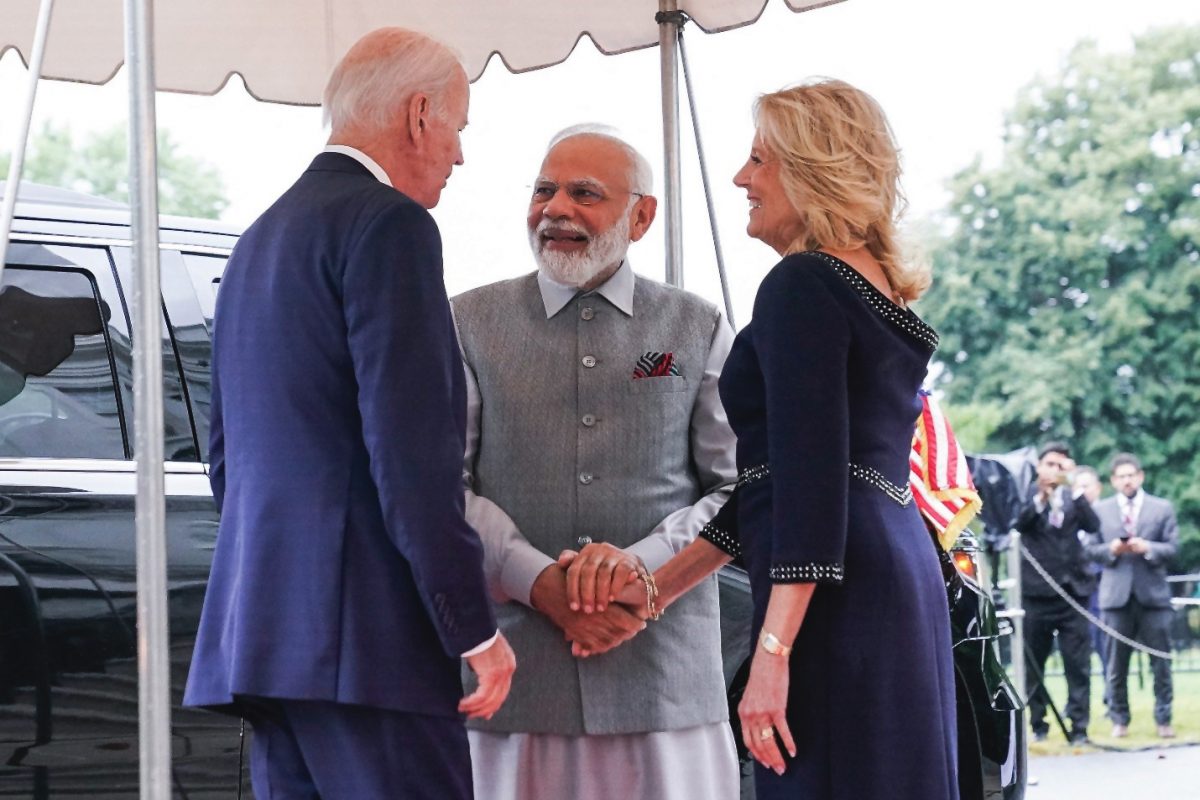WASHINGTON, (Reuters) – U.S. President Joe Biden and Indian Prime Minister Narendra Modi are expected to deepen defense and technology cooperation between their countries during Modi’s official visit to the White House, despite lingering concerns about human rights in India.
Two days of carefully orchestrated official events had a bumpy start yesterday afternoon, however, when Modi was so late to a planned tour of the National Science Foundation that the president’s wife Jill Biden, a teacher, started without him.
Modi, who arrived about 30 minutes after the scheduled start of the tour, apologized. Later he came to the White House for a private dinner with the Bidens. The first couple and the prime minister smiled and laughed together outside the White House before going indoors. Modi will attend a state dinner on Thursday night, after addressing Congress and holding a rare press conference with Biden.
Washington wants India to be a strategic counterweight to China and sees India as a critical partner. Modi is seeking to raise the influence that India, the world’s most populous country at 1.4 billion, has on the world stage.
Biden is expected to raise U.S. concerns about democratic backsliding in India under Modi’s Hindu nationalist Bharatiya Janata Party during the visit, national security adviser Jake Sullivan told reporters on Tuesday. “We do so in a way where we don’t seek to lecture or assert that we don’t have challenges ourselves,” he said.
U.S. companies are welcoming Modi warmly, and business agreements in artificial intelligence (AI), quantum computing and investments in India by Micron TechnologyMU.O and other U.S. companies are expected during the visit.
At his event with Jill Biden, Modi invited American students to come to India and said he was happy to meet “young and creative minds” as soon as he arrived in Washington. Modi said India was training students in AI and had started labs across the country.
More than 200,000 Indian students were studying in the United States as of last year, according to the White House.
Thursday’s press conference is unusual. Modi has not addressed a single press conference in India since becoming prime minister about nine years ago. In May 2019, he attended a press conference in India but never took questions.
Modi has been to the United States five times since becoming prime minister in 2014, but the trip will be his first with the full diplomatic status of a state visit. A vegetarian menu will be served at the state dinner on Thursday.
President Biden will give Modi a vintage American camera and the first lady will give him a signed, first edition copy of “Collected Poems of Robert Frost,” the White House said.
Modi will address U.S. CEOs at a Friday reception, as American companies plan new investments in India.
On Tuesday he met with Tesla TSLA.O chief Elon Musk in New York, who said afterwards he plans to make the vehicles available in India as soon as possible.
Biden is under pressure by his fellow Democrats to discuss human rights with Modi.
Rights advocates, who plan to protest during Modi’s visit, on Wednesday said Biden should publicly call out Modi’s human rights record, saying the approach of U.S. administrations of raising issues in private with the Indian leader has not stemmed what they described as deteriorating human rights in India.
“It has not worked,” Zaki Barzinji, who served in the Obama administration as the White House liaison to religious minorities, said at a press conference in Washington organized by Indian-American civil rights and interfaith organizations.
Both Biden and Modi are grappling with Beijing’s flexing its muscle in the Indo-Pacific region and beyond.
“This visit is not about China. But the question of China’s role in the military domain, the technology domain, the economic domain will be on the agenda,” Sullivan said.
New Delhi, which often prizes its non-alignment in conflicts between great powers abroad, has frustrated Washington by maintaining some defense and economic ties with Russia after the invasion of Ukraine.
Biden will bring up Russia and Ukraine ahead of the G20 summit later this year that will be held in India, Sullivan said.
A senior State Department official said there had been a “subtle shift” in India’s approach to Russia since Modi told Russian President Vladimir Putin in September that “today’s era is not an era of war.”
Other Indian officials had challenged Russia for violating Ukraine’s territorial integrity and over rhetoric on nuclear weapons in recent months, said the official, who briefed reporters on condition of anonymity.
On Thursday, Biden and Modi will make announcements on the “co-development and co-production of military systems, including some very advanced systems,” said the official, describing this as part of a broader move by India to buy weapons from other sources than traditional supplier Moscow.
Washington accepts that India will continue buying Russian oil, as long as it does so “at rock bottom prices” below a price cap agreed by developed nations, the official added.






